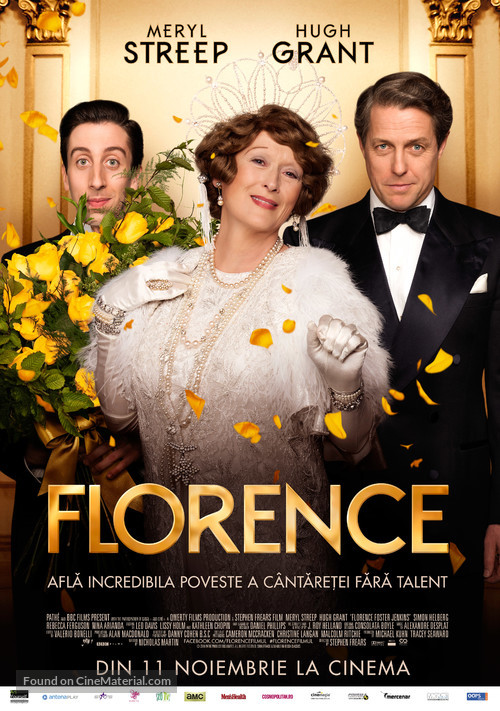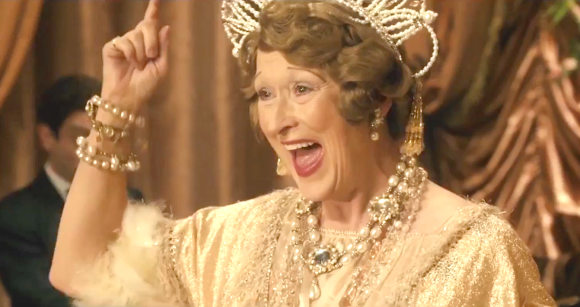

“Florence Foster Jenkins” never makes us feel like Florence is a fraud in the least. And when she does, we can’t help but laugh at her. She is introduced as a big diva and the audience is left to anticipate her greatness when she strides before the orchestra to sing her first note. The film certainly wants us to connect and empathize with her, but there are suggestions of her own madness.

“Marguerite’s” relationship to its protagonist is far more ambiguous. The film takes time to establish her benevolence before letting us hear her sing. The former adores its title character, casting her, in Streep’s interpretation, as an eccentric woman.

“Florence Foster Jenkins” is a comedy with a tragic end while “Marguerite” is a tragedy with comedic elements. “Marguerite,” however, in avoiding the use of Foster Jenkins’ name and setting it in France, is able to do a lot more with the material.įor one, the tones are completely different. The Streep film, directed by Stephen Frears, leaves no doubt that it wants to be a straight-up biopic and as such, it hues closely to the major events of her later life, leading up to her death. It is truly interesting to see how the two approach the subject matter of this woman’s life. But fortune has a way of getting people through the door and Jenkins not only managed to buy her way into recording an album (that remains a source of controversy decades later) but also got to stage an infamous recital at Carnegie Hall.įor some perspective on Foster Jenkins’ singing, voila: It’s fascinating that the two productions came out so close to one another, especially considering that to that point, there had been no fiction film based on her story.įlorence Foster Jenkins was a wealthy music patron who was an amateur musician, who unwittingly had no idea that she was nowhere near a singer of great quality. A few months earlier, French director, Xavier Giannoli released “Marguerite,” a film based loosely on the life of Foster Jenkins that was a massive critical success with the 41 César Awards. Raking in over $56 million worldwide, it was considered a smash-hit.īut it wasn’t the first film to take a look at the unique figure in the world of opera. The film was a major hit, earning the legendary actress an Oscar nomination for Best Actress. ”īack in early 2016, the world clamored over Meryl Streep’s interpretation as the famed (or infamous) Florence Foster Jenkins. This week ’ s installment will look at two interpretations of the life of “ Florence Foster Jenkins. We will select a section or a film in its entirety, highlighting the impact that utilizing the operatic form or sections from an opera can alter our perception of a film that we are viewing. But the film is having far too much fun to really get under the fingernails of all that.“ Opera Meets Film ” is a feature dedicated to exploring the way that opera has been employed in cinema. Bayfield (a wonderful Grant) has genuine affection for Florence but while their sexless marriage may be a result of her syphilis there isn’t any sexual chemistry between them he has an open affair (with Rebecca Ferguson) and uses his wife's public appearances to feed his own ego with over the top Shakespeare soliloquies. As they prepare for Carnegie Hall, Bayfield scurries about town shielding Florence from the laughers and ensuring her performances get rave reviews.Īvoiding the cruelty of Marguerite, Frears's film is light and bubbly throughout and yet there's always the terribly depressing notion bubbling away underneath: what if that thing you live your life for you have little talent at? Frears doesn't wholly embrace this and, unlike Margeurite, doesn't ask if her husband is doing this out of love or because she funds his lifestyle. Even famed voice coach Arturo Toscanini (John Kavanagh) goes along with it, calling her voice 'authentic' and 'nothing else like it'. The only thing is, she can't sing a note and, much to hired pianist Cosme McMoon's (Helberg) amusement, this is an open secret. But now she longs to step into the limelight as an opera singer. Is true love to be honest with the terrible truth or to shield a loved one from ridicule? Marguerite may have beaten Florence Foster Jenkins to the punch (released in the IFI last month) but Stephen Frears's similar film, his based on a true story, is still entertains thanks to the terrific turns from the three central performances.ġ940s New York and Florence Foster Jenkins (Streep) is an heiress and patron of the Verdi, a well-to-do Manhattan club, for twenty five years with her husband, former actor St.


 0 kommentar(er)
0 kommentar(er)
